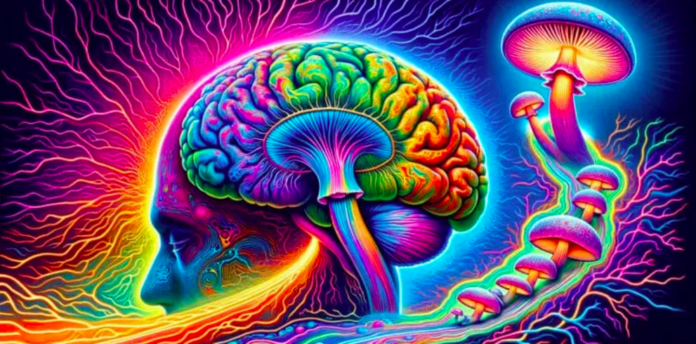Psychedelic mushroom use linked to lower psychological distress in those with adverse childhood experiences
In a recent study conducted in Canada, researchers have uncovered a potentially promising connection between the use of psychedelic mushrooms and a reduction in psychological distress, particularly among individuals who have experienced adverse childhood experiences. The study was published in the Journal of Psychoactive Drugs.
Psilocybin, the compound responsible for the hallucinogenic properties of magic mushrooms, has been the subject of growing interest in recent years for its potential therapeutic applications. Previous research has suggested that psilocybin use might be associated with improved mental health, decreased suicidality, and reduced risk of various adverse outcomes.
The current study aimed to explore the relationship between psilocybin use and psychological distress, with a specific focus on individuals who had experienced adverse childhood experiences. ACEs, such as abuse, neglect, and exposure to violence, can have long-lasting negative effects on mental health. Understanding how psilocybin may impact individuals with a history of ACEs could provide valuable insights into its therapeutic potential.
“In recent years, we’ve seen the re-birth of psychedelic medicine and we did this study because we were particularly interested whether psilocybin, which is widely accessible, had potential benefits for people with adverse childhood experiences,” said study author Kiffer G. Card, an assistant professor of health sciences at Simon Fraser University.
To conduct their research, the scientists recruited participants through online advertisements on platforms like Facebook, Instagram, and Reddit, as well as through email and other social media channels. The study focused on people living in Canada and aimed to explore the use of psilocybin in this context, where legal regulations surrounding its use are evolving.
In total, the study included 1,249 participants, with an average age of 39.8 years. The participants came from diverse backgrounds, with various gender identities, ethnicities, and sexual orientations.
The participants provided information about their demographics, such as age, gender, ethnicity, sexual orientation, income, education, and disability status. They also reported their psilocybin use history, including when they last consumed it, the dosage levels, and their reasons for using it.
Participants also completed two key assessments: The Adverse Childhood Experiences (ACE) Questionnaire assessed participants’ experiences of childhood trauma, such as abuse, neglect, exposure to substance use, and domestic violence, while the Psychological Distress Scale (K6) measured the frequency of distressing symptoms, like nervousness, hopelessness, restlessness, depression, and worthlessness, experienced by participants in the past 30 days.
Participants who had used psilocybin in the past three months reported lower levels of psychological distress compared to those who had not used it during this period. This suggests that recent psilocybin use may be associated with a reduction in psychological distress.
Interestingly, the study found that the effect of psilocybin on reducing psychological distress was particularly pronounced among individuals who had experienced higher levels of adverse childhood experiences. In other words, psilocybin seemed to have a more significant impact on reducing distress in those with a history of childhood adversity.
The study also showed that a significant proportion of participants had used psilocybin in their lifetime and expressed positive opinions about its benefits and safety. Many reported using it to address mental health and emotional challenges, indicating its potential as a self-help tool.
“The average person reading our study can see that there is promising potential for psilocybin as a therapeutic agent,” Card told PsyPost. “Of course, our study is only observational, but in the context of other experiments and studies it’s increasingly clear that individuals do benefit to some extent from using psilocybin. This is especially true for people with more severe exposures to childhood distress.”
“The findings were not all that surprising to us, especially given the flood of other supporting studies on this topic that have come out in recent years. But we’re glad to be adding to the scientific evidence which is supportive of policy changes related to drug control and medical use of psilocybin and other psychedelic medicines.”
While these findings are promising, it’s important to note that the study has some limitations. The research relied on an online, non-representative sample, which could introduce bias. Additionally, the study was cross-sectional, meaning it couldn’t establish causal relationships between psilocybin use and reduced distress.
“The major caveat, as I noted, is the cross-sectional observational design of our study,” Card explained. “We rely on self-reported data from people who volunteered to participate in our study. However, the extent to which these limitations affect our results is not clear. Our findings are strongly aligned with many other studies that leverage a wide variety of other methodologies.”
The study, “Therapeutic Potential of Psilocybin for Treating Psychological Distress among Survivors of Adverse Childhood Experiences: Evidence on Acceptability and Potential Efficacy of Psilocybin Use“, was authored by Kiffer G. Card, Ashmita Grewal, Kalysha Closson, Gina Martin, Laura Baracaldo, Sandra Allison, Daniel J. Kruger, and Zach Walsh.

